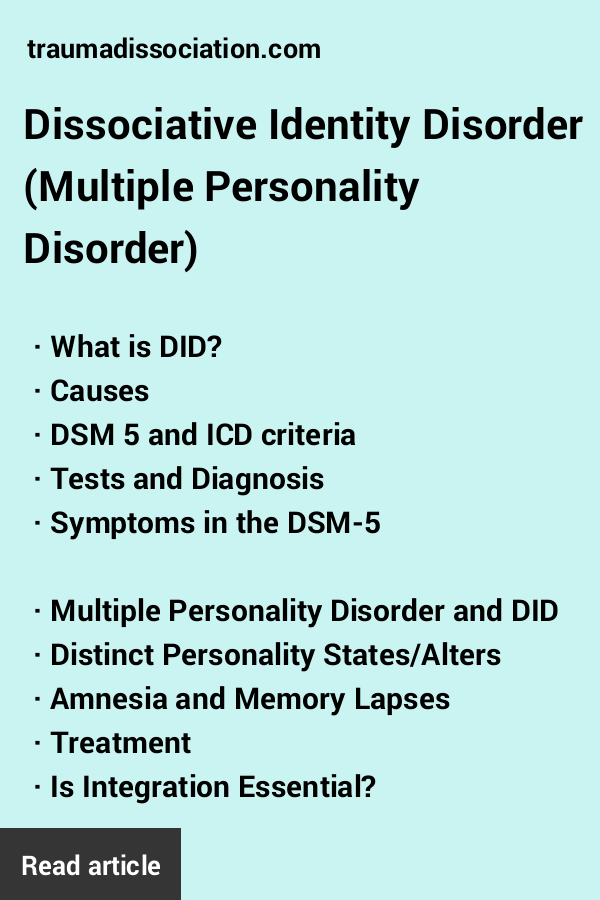

What are dissociative disorders?.Ĭhoi KR, Seng JS, Briggs EC, et al. Dissociative disorders.Īmerican Psychiatric Association. Dissociation in posttraumatic stress disorder: Evidence from the World Mental Health Surveys. The role of attachment trauma and disintegrative pathogenic processes in the traumatic-dissociative dimension. Dissociative disorder not otherwise specified: This term is used for a dissociative disorder that does not fit into one of the categories above.įarina B, Liotti M, Imperatori C.

Dissociative identity disorder (formerly called multiple personality syndrome): Identity confusion and identity alteration may occur to varying degrees with this syndrome, with a person's personality "split" between one or more alternative personalities.Derealization may occur along with depersonalization and refers to a feeling of being detached from one's surroundings. While roughly 50% of adults will have at least one episode of depersonalization, it is classified as a disorder if the depersonalization has a negative impact on a person's relationships or work life. Depersonalization/derealization: Depersonalization refers to the sense of being outside of your body or feeling as if you are observing your life from the sidelines.Dissociative fugue: This disorder is characterized by wandering off and having no memory of an event or period of time.Dissociative amnesia: This disorder is common, and is characterized by memory loss regarding important events or periods of time in a person's life.The sense of detachment may come and go over a period of years, interrupting daily life, interfering with work or relationships, and leading to delusional thinking. Patients with depersonalization disorder feel outside of themselves, observing their own behavior from a distance.

They often report feeling the presence of others, or hearing the voices of others, inside their own minds. People with this disorder experience splits in their identity, feeling themselves to be inhabited by more than one self. This disturbance involves assuming different identities to cope with unbearable stress. Dissociative Identity Disorderĭissociative identity disorder was formerly known as multiple personality disorder. In this fugue state, during which they are unsure of who they are, they leave work, home or school and travel for days, weeks or months. Though temporary, this disorder causes patients to become confused about their own identities and to perhaps assume new ones. Dissociative FugueĪ rare type of dissociative disorder, dissociative fugue involves physical escape from highly distressing events. The memory loss involved may be all-encompassing general amnesia, localized amnesia surrounding a period of hours or days, selective amnesia where only certain parts of an event are remembered, or systematized amnesia where certain aspects of the past are blotted out, such as anything pertaining to a particular person. The patient with dissociative amnesia blocks out terror or extreme pain with an involuntary loss of memory. This type of dissociative disorder involves sudden extensive memory loss after a traumatic event and is most frequently diagnosed in children.


 0 kommentar(er)
0 kommentar(er)
